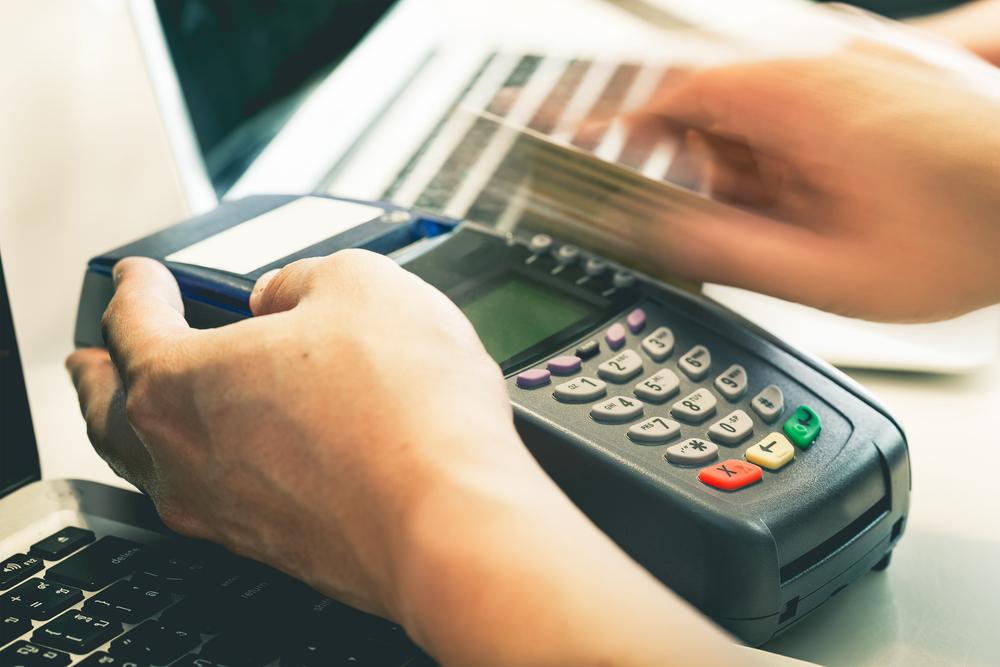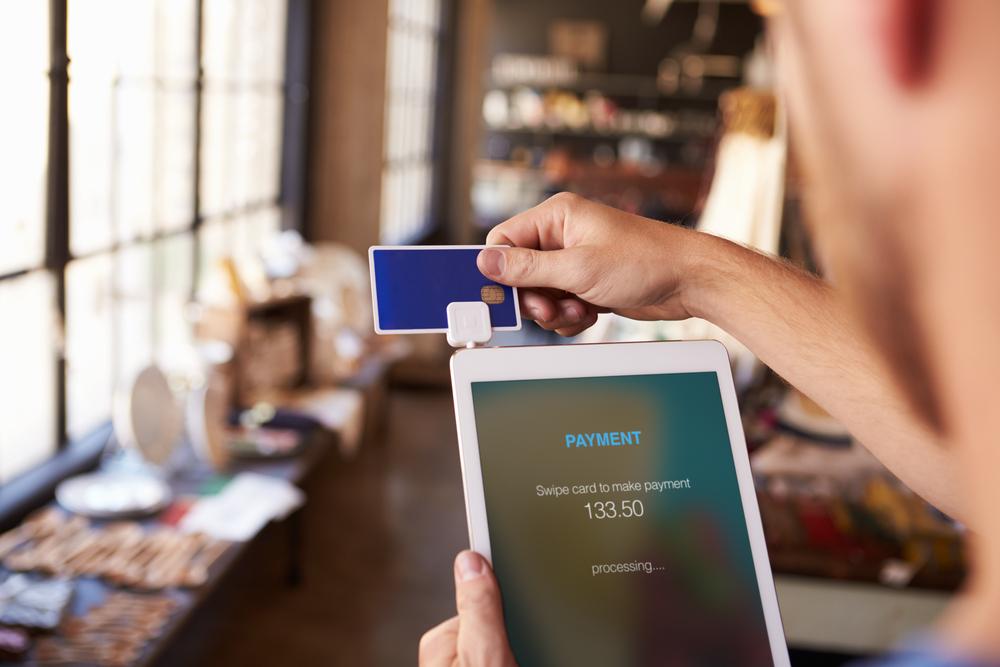Business News Daily provides resources, advice and product reviews to drive business growth. Our mission is to equip business owners with the knowledge and confidence to make informed decisions. As part of that, we recommend products and services for their success.
We collaborate with business-to-business vendors, connecting them with potential buyers. In some cases, we earn commissions when sales are made through our referrals. These financial relationships support our content but do not dictate our recommendations. Our editorial team independently evaluates products based on thousands of hours of research. We are committed to providing trustworthy advice for businesses. Learn more about our full process and see who our partners are here.
What Are NFC Mobile Payments?
This contactless payment option can boost customer convenience and facilitate seamless transactions.

Table of Contents
NFC mobile payments are contactless digital payments where mobile wallets or NFC-enabled credit cards communicate with special card readers. NFC technology allows businesses to accept customer payments quickly and conveniently without requiring employees to handle cards.
Editor’s note: Looking for the right credit card processor for your business? Fill out the below questionnaire to have our vendor partners contact you about your needs.
NFC mobile payments are an ideal payment processing option for many businesses, including retailers, restaurants and professional service providers. If your business is considering accepting NFC mobile payments, read on for details on how these transactions work, what’s involved, and their pros and cons.
What is NFC?
NFC stands for “near-field communication.” This technology enables communication and data sharing between wireless-enabled devices in close proximity. NFC has many applications, including key fobs for access control systems, ID verification and wireless device pairing.
NFC is a straightforward technology. Accepting NFC mobile payments is much like accepting traditional credit cards with magnetic stripes. In traditional credit card transactions, the credit card machine reads the card’s magnetic stripe. In contrast, in NFC transactions, an NFC reader sends a signal picked up by an NFC antenna on an NFC-enabled device.
How do NFC mobile payments work?
NFC payments require an NFC-enabled card reader. When this reader is initiated through a point-of-sale (POS) system, it sends a signal that searches for an NFC-enabled payment device. When the reader detects the antenna of an NFC-enabled device, such as a phone or NFC-enabled credit card, the payment device communicates the payment info to the reader, and the payment is processed.
How to process NFC mobile payments
Preparing your business to accept NFC mobile payments is relatively straightforward. After choosing a payment processor that supports NFC-enabled technology, you’ll need to set up a merchant account with its bank or processing company, connect the card reader and begin accepting payments.
These are the six primary steps you’ll take to set up NFC payments:
- Select a payment processor.
- Choose an NFC-enabled reader.
- Install the reader and its software.
- Connect to the internet.
- Set up a merchant account.
- Accept payments.
After processing payments using an NFC reader, the proceeds will go directly into your merchant account, just like typical credit card transactions. Often, these proceeds are transferred into your business bank account automatically the following day, but you may need to initiate transfers periodically to sweep your balance.
Best credit card processing services for NFC mobile payments
Most of the best credit card processors support NFC mobile payments via mobile wallets like Apple Pay and NFC-enabled cards. The right processor for your business will facilitate your customers’ preferred payment methods and charge reasonable fees.
Here’s a look at some top processors to consider when you want to accept NFC mobile payments:
- Stax: Stax supports NFC mobile payments and other popular traditional and digital payment methods, including Venmo. It’s a great option for higher-volume businesses that process at least $5,000 monthly. Stax offers several plans on a monthly subscription basis that can suit your business as it grows. The company charges a small, flat fee for transactions and doesn’t take a cut of your revenue. Check out our Stax review for more information on its dedicated account managers for high-transaction businesses and tools like invoice customization, sales tracking and card information storage.
- Chase Payment Solutions: When fast merchant payments are crucial – and you want to avoid superfluous fees – Chase Payment Solutions is an excellent option. Chase’s fast integration process will get you up and running quickly, and the platform integrates seamlessly with many e-commerce platforms. Our Chase Payment Solutions review details the benefits of working with a prominent credit card processor that’s also an acquiring bank.
- Helcim: Helcim has an easy, fast approval process and transparent pricing, making it a good choice for small businesses with a well-established customer base. You’ll have access to free business management tools like invoicing and a virtual terminal. Read our Helcim review to learn about its volume discounts – an excellent option for businesses with a high sales volume.
- North American Bancard: Not every processor works with businesses in high-risk industries. North American Bancard is an exception; it works with companies across many industries, verticals, and offers free equipment and a full slate of services and products. Our North American Bancard review explains its supported payment methods, easy onboarding process and low rates.
Types of businesses that use NFC payments
NFC payments are an excellent option for many different types of businesses. They are rarely the only option offered, but they’re a great benefit for most customers and convenient for employees – especially businesses like retailers that process multiple payments daily.
- Brick-and-mortar retailers: Businesses like clothing stores, antique dealers, home goods stores and others accept NFC mobile payments.
- Mobile retailers: NFC mobile payments lend themselves to mobile businesses, including street vendors, flea market booth operators and others.
- Restaurants and food trucks: NFC is especially useful for food trucks and food-service businesses that perform many carry-out transactions.
- Healthcare providers: Doctors and dentist offices, therapists, counselors, and pharmacists all enjoy added convenience with NFC.
- Fitness and recreation facilities: Fitness and recreation facilities like gyms, physical therapists and other operations that serve individual consumers will appreciate NFC payments.
- Charities and nonprofit organizations: NFC is great for hosting events or processing payments for mobile fundraisers.
- Professional service providers: Not many attorneys or accountants accept NFC payments, but many professional service centers do.
Types of devices that support NFC mobile payments
Businesses that want to process payments using NFC will need an NFC reader. Once the reader is connected to the POS system, businesses can allow customers to pay for transactions using several devices.
- Smartphones: Several Android apps and iPhone apps facilitate mobile payments.
- Smartwatches: Watches with a wearable OS often support NFC.
- Tablets: Like phones, tablets can be NFC-enabled, though a little awkward to handle when initiating payments.
- Laptops: Using a laptop to process a payment would be clunky, but it’s technically possible.
- EMV-chipped credit and debit cards: Most major credit cards issued today have EMV chips that support NFC technology. This is the most common form of contactless payment.
Are NFC mobile payments safe?
NFC payments are generally considered safe. The technology is every bit as secure as typical mobile credit card processing. However, there are payment fraud and hacking risks to consider.
- Fraud: The risk of payment fraud can be slightly higher with NFC because businesses typically don’t handle the customers’ NFC-enabled devices to verify the cardholder. It’s harder to ensure a customer has the right to issue payment.
- Hacking: NFC payment records can be hacked, just like anything else.
Because of the risk of fraud or hacking – and because they rely on a wireless signal – NFC mobile payments are considered slightly less secure than other payment methods, including traditional swipe transactions. However, NFC devices with multifactor authentication reduce security risks.
Pros and cons of accepting NFC mobile payments
Here’s a look at the primary advantages and drawbacks of using NFC mobile payments.
Pros
- NFC mobile payments are convenient. Customers can use many different devices for payment, and employees don’t have to handle the device.
- NFC mobile payments are appropriate for a wide range of businesses. NFC technology can be used across a range of applications by businesses in many different industries.
- NFC mobile payments facilitate seamless payments. Payments fund within 24 hours and often transfer to your business bank account the following day.
- NFC mobile payments are secure. As discussed above, NFC mobile payments can be considered slightly less secure because of cardholder verification issues. However, today, most NFC payment apps require multifactor authentication – making it extremely hard for payments to be intercepted.
Cons
- NFC mobile payments can be expensive. Businesses processing credit card or NFC payments pay several cents per transaction plus a percentage of the total transaction value, which can add up for larger businesses.
- NFC mobile payments are susceptible to security issues. Like other credit card transactions, payments processed using NFC can be hacked.
- NFC mobile payments have fraud risks. Because employees don’t typically handle customer devices when initiating NFC payments, they aren’t checking identification or otherwise verifying customers’ identities.
- Consumers must know how to use NFC mobile payments. Customers must know how to initiate payments to use their NFC-enabled devices properly. They must be within inches of an NFC reader to initiate transactions; plus, card readers can vary, so they may not always be comfortable.
Moving into NFC payment acceptance
Whether you own a downtown clothing boutique, a bustling restaurant chain or a dental office serving a steady stream of patients, accepting NFC payments can benefit your business. If you’re ready to jump in and try something new, remember that NFC transactions often utilize the same equipment as traditional credit card processing services. This mode of payment acceptance toggles well with various devices like smartphones, tablets and smartwatches.
Before getting started, ensure you do your research on processors and find an option that best offsets risks like fraud, hacking and user error. When you feel ready to move forward with accepting NFC payments, you and your customers will likely appreciate the flexibility this option affords.
Elizabeth Crumbly contributed to this article.






